Table of Contents
Feather plucking, also called feather picking, is a known unpleasant habit of African Grey parrots. It is more specifically seen in Congo African Grey than in Timneh African Grey, but either way, this habit is something that all African Grey owners fear and dread.
In the wild, feather plucking is done by birds for several reasons. Most notably, they use their plucked feathers to line their nests during breeding season. However, in captivity, African Grey feather plucking could be a sign of behavioral, health, or environmental problems for your bird.
What are the causes of feather plucking in African Grey parrots?
Once you have noted that your African Grey feather plucking has started plucking its feathers, you should immediate take it to an avian veterinarian for a check-up. If it is determined that your African Grey is free of psittacine beak and feather disease and other physical illness, then it is most likely that the feather plucking is caused by an environmental issue.
To assess the cause of your African Grey’s feather plucking, the vet will conduct a complete physical examination, which may include taking a blood sample. This is to ensure that all factors are considered and that proper treatment will be given to correct the behavior before it progresses further.
Malnutrition and diet
Does your African Grey eat a healthy diet? An unhealthy diet can lead to nutritional deficiency, which can stress your African Grey out to the point of resorting to feather plucking. If you think the feed for your African Grey feather plucking can be better, try including some fresh fruits and vegetables. Of course, you should wash these products thoroughly before giving them to your bird. You should also remove seeds and pits, as these could be toxic for your African Grey. Some seeds have trace amounts of mycotoxins, and the seeds of fruits such as apples, peaches, and apricots have trace amounts of cyanide.
Parasites
Parasites can also be a cause for your African Grey feather plucking. They are detrimental to your bird’s overall health. Have your African Grey checked out by the avian vet to see if it is suffering from either internal or external parasites. External parasites, in particular, cause itchiness and irritation that could result to excessive preening and plucking. Some external parasites that can be found on bird feathers are lice and mites. The vet will prescribe medication to remove internal parasites or an avian-safe insecticide spray or powder for external parasites.
Lack of Sleep
Does your African Grey get enough sleep? It needs more sleep than the average human; your African Grey needs to get 8 to 12 hours of uninterrupted sleep to be healthy. It is better if you provide a dark, secluded place for your African Grey to comfortably rest.
Environmental factors
Is there too much noise or disturbance where you’re housing your African Grey? If your parrot is constantly exposed to such distractions, keeping it awake, it can lead to stress and anxiety causing it to pluck its feathers. Make sure to provide your African Grey with a calm, quiet environment that is conducive to resting.
You should also avoid its exposure to environmental toxins such as tobacco smoke, aerosol fumes, floor polish, and other such substances that may cause allergies or discomfort. Room fresheners, scented candles, and perfumes can also irritate an African Grey feather plucking, so make sure to keep these products away from them too.
The natural habitat of African Grey parrots is the tropical rainforests of Central Africa. This is why they are naturally pre-disposed to medium to high levels of humidity. If the humidity levels are too low, it may lead to dry skin and feather follicles. It is suggested that the humidity levels be maintained at around 60%. You can use humidifiers near your African Grey. Be sure that the area isn’t too wet either, lest mold spores set in.
Clean Cage
Another environmental factor you should consider is the cleanliness of your African Grey’s cage. Since they are naturally hygienic animals, a dirty cage can lead to detrimental consequences for them. Regularly clean their cage, and give them regular baths too. If possible, expose them to moisture and steam while you are taking a shower.
Boredom and loneliness
African Grey parrots need lots of attention from their flock. In the wild, they keep their boredom in check by being busy most of the time foraging for food. In captivity, this isn’t the case, as food and water are constantly provided.
Boredom can easily set in when there aren’t mentally stimulated. When left alone for too long, your African Grey feather plucking can feel debilitating loneliness that causes stress, leading to self-mutilation through excessive feather plucking.
To keep this from happening, provide your African Grey parrot with a variety of toys to chew on, play with, take apart, and put back together. Their toys should come in different shapes and sizes, and better if they have different textures as well. Provide entertainment by placing its cage by the window during the day, enabling it to watch outside.
If possible, consider getting your African Grey a mate who will keep it company even when you’re not there. Aside from easing loneliness, a mate can also help alleviate your African Grey’s boredom, as parrots spend much time grooming each other.
Correcting the Feather Plucking Behavior
It is important that you take your African Grey to a vet immediately once you’ve noted it has started plucking its feathers. This could become a habit, so it’s best to nip it in the bud before it escalates. Also, remember to not outwardly express dismay when you see your African Grey feather plucking; giving it such attention can encourage the behavior further. Be calm as you take steps to keep your African Grey’s beautiful plumage neat and intact.

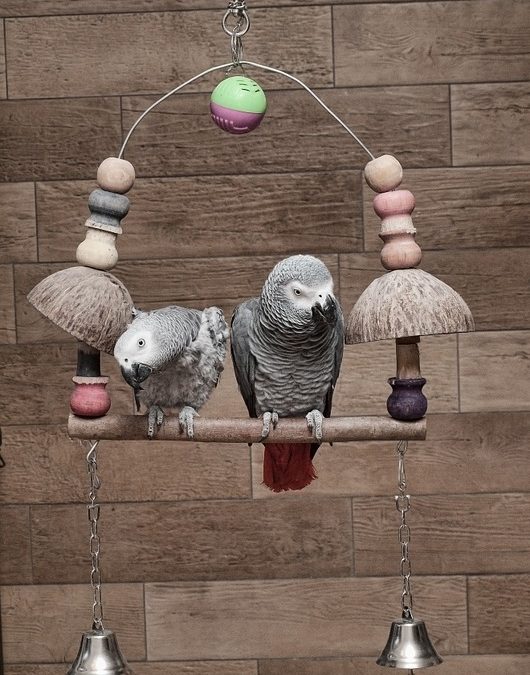
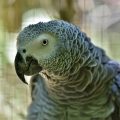
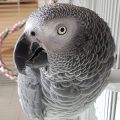
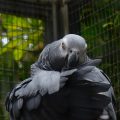
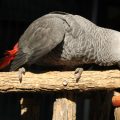
 Author and long-time animal lover. Sharing knowledge on pet care through experience and the written word.
Author and long-time animal lover. Sharing knowledge on pet care through experience and the written word. 